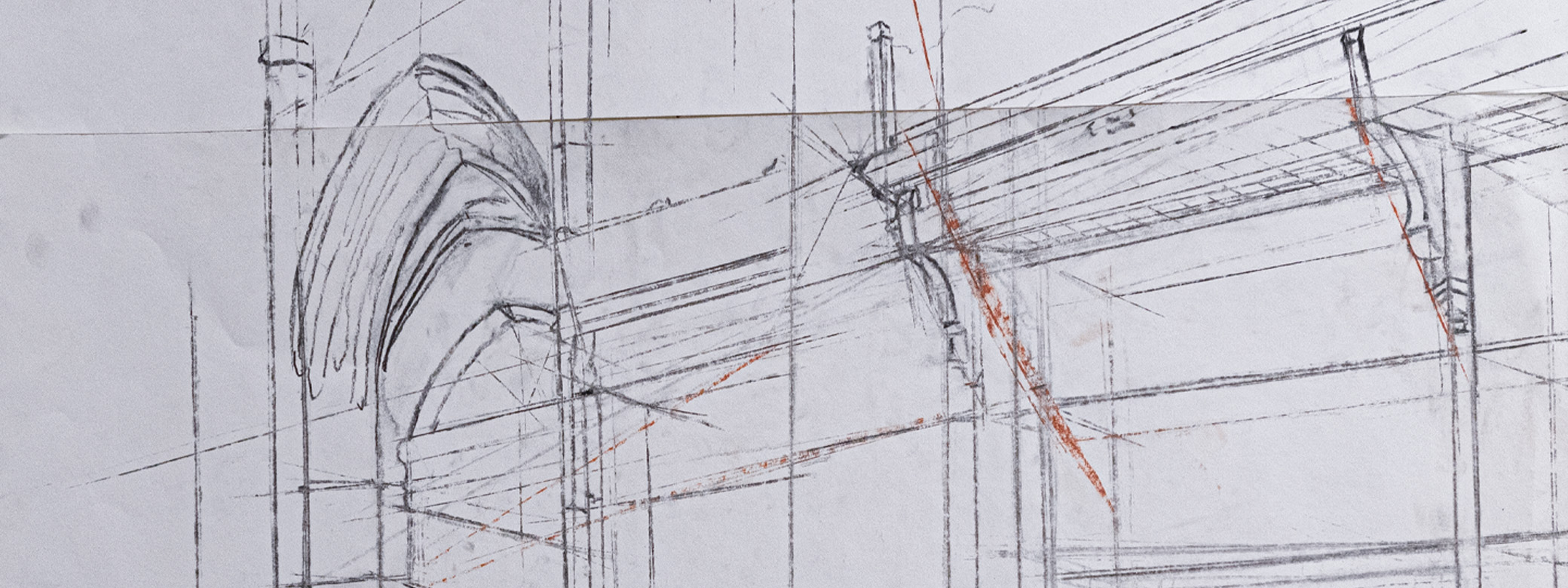Prof. Axel Roesler, Ph.D.
Professor, Interaction Design
Chair, Division of Design
School of Art + Art History + Design
Adjunct Professor
Human Centered Design and Engineering
Overview
This seminar will provide you with a theoretical framework to define design by describing its process, approaches, and methods. We will read and discuss key texts on design methods and definitions of design - a body of tests that is known as The Design Canon, and explore how the discourse in the design fields renders design both as a discipline and mode of inquiry that ranges from shaping products as vehicles for consumerism to designing design as a mode of critical inquiry and responsible futuring.
In the course of this seminar we will examine the activity of designing—not by designing products, systems, and services, but by a critical examination of the underlying concepts that constitute design. We will relate these concepts with discussions in the current HCI and design discourse, and we will discuss the various perspectives on design knowledge and values, evaluate and explore their benefits, limitations, and possibilities to acquire vocabulary and frameworks to contextualize design and the shaping of promising futures responsibly.
Learning Objectives
At the end of this course you will be able to define design, describe design, promote design, and advocate for design in contexts where people do their work, live their lives, and interact with other people.
Course Structure
The class will meet on in person in the Design Graduate Studio (Art 204) once a week on Mondays from 8:30-11:20.
Weekly reading responses will provide a catalogue of questions to shape the discussions of readings in class on Mondays
For the final assignment you will write a paper that addresses a research question you identify. Your research question should be aimed at a thread that we have discussed during the seminar, and you will draw arguments from our readings and additional texts you identify to develop a position that is pertinent to your research question.
Course Schedule
1.
(10-02)
(No class - Axel is in quarantine)
Read Christopher Alexander: Notes on the Synthesis of Form (1964) Part 1
Alexander differentiates between traditional design practice and some form of modern design practice. At first he elevates this 'modern' design practice as an intentional design practice that his the result not just of training but also of design education - he demonstrates its power by a number of achievements and complex design challenges it is capable to address - and then shows a multitude of its shortcomings, rendering traditional design practice as the more appropriate form of design in the long run. Alexander illustrates the structure of designing as a system and defines design as finding the fit between form and context.
2.
(10/09)
Design as an Adaptive System
Discussion of
Christopher Alexander: Notes on the Synthesis of Form (1964) Part 1
3.
(10/16)
Design and Artificial Intelligence
Norbert Wiener: The Human Use of Human Beings (1953), Preface and chapters I,II, and III.
4.
(10/23)
The Sciences of the Artificial
Herbert Simon: The Sciences of the Artificial (1996), Chapters 5 & 6
UW online version of the book here: https://alliance-primo.hosted.exlibrisgroup.com/primo-explore/fulldisplay?docid=CP71290127650001451&context=L&vid=UW&lang=en_US&search_scope=all&adaptor=Local%20Search%20Engine&tab=default_tab&query=any,contains,the%20sciences%20of%20the%20artificial
5.
(10/30)
Critique of Solutionism and Universalism
Horst Rittel & Melvin Webber: Planning Problems are Wicked Problems (1973)
6.
(11/06)
Design as Reflective Practice
7.
(11/13)
Critique of the Design Canon
Daniela Rosner: Critical Fabulations (2018) Chapter 1
8.
(11/20)
Critical Design
Bruce & Stephanie Tharp: Discursive Design (2018) Chapter 7 PDF pages 6-22
UW online version of Speculative Everything here (optional, for context): https://alliance-primo.hosted.exlibrisgroup.com/primo-explore/fulldisplay?docid=CP71203062520001451&context=L&vid=UW&lang=en_US&search_scope=all&adaptor=Local%20Search%20Engine&tab=default_tab&query=any,contains,speculative%20everything
9.
(11/27)
Design, the Anthropocene, and Posthumanism
Ron Wakkary: Things we Could Design for More Than Human-Centered Worlds, Chapters 1 & 8 (2022)
You can find the full text as ebook online through UW libraries here: https://orbiscascade-washington.primo.exlibrisgroup.com/discovery/fulldisplay?docid=alma99162475125801452&context=L&vid=01ALLIANCE_UW:UW&lang=en&search_scope=UW_EVERYTHING&adaptor=Local%20Search%20Engine&tab=UW_default&query=any,contains,Things%20we%20could%20design%20for%20more%20than%20human%20centered%20worldsLinks to an external site.
10.
(12-04)
Closing Discussion
Axel's office hours:
Wednesdays 9:30 - 11:30 per appointment
roesler@uw.edu
Grading
Your final grade in this course will be comprised of
6 reading response papers (48% of final grade)
Participation in Discussions (12% of final grade)
Final paper (40% of final grade)
Grading Key
3.9-4.0 The highest possible performance in all aspects of the course with work exemplifying exceptional quality. Exhibits outstanding creative potential.
3.5-3.8 Exhibits creative potential with superior performance in most aspects of the course; high quality in the remainder. Well prepared for subsequent courses in the field.
3.2-3.4 High performance in most aspects of the course. Very good chance of success in subsequent courses in the field. Exhibits some creative potential.
2.9-3.1 Good performance in some of the course; satisfactory performance in the remainder. Exhibits some creative potential. Good chance of success in subsequent courses in the field.
2.5-2.8 Demonstrates the minimum amount of research needed to complete the course with satisfactory performance.
2.2-2.4 Met basic requirements in most of the course, with the remainder being somewhat substandard.
1.9-2.1 Evidence of some learning but generally substandard performance. Marginal chance of success in subsequent courses in field.
0.7-1.8 Little evidence of learning. Poor performance in all aspects of the course. Totally unprepared for subsequent courses in the field.
Equal Opportunity
In concurrence with the University of Washington’s core values, and in compliance with State and federal regulations, the School of Art + Art History + Design reaffirms its commitment to equal opportunity. The commitment extends to the recruitment of faculty, staff, and students who exhibit a dedication to creative and academic excellence and who demonstrate the ability to work with a diverse spectrum of populations.
Diversity
The School of Art + Art History + Design fosters a respectful, inclusive community that supports creative and critical expression and scholarship amidst a culture that accepts the value of every individual. The School encourages students, faculty, and staff to engage in healthy
dialogue and respect the values and global perspectives of a diverse population. The School promotes and encourages a culture of compassion, understanding, and an obligation to respectful discourse in classrooms, meeting rooms, studio spaces, and beyond. The School’s philosophy is reflected in our engagement with community partners and research endeavors locally, nationally, and globally.
Student Code of Conduct
The University of Washington has established rules regarding student conduct. Through the Student Conduct Code, UW students hold themselves to the highest standards of ethics, integrity and accountability. More information at UW Community Standards & Student Conduct (CSSC): www.washington.edu/cssc/
Violence Awareness and Prevention
—Preventing violence, discrimination, harassment, and retaliation is everyone’s responsibility
—Call 911 for emergency help
—Call (206) 685–SAFE to report non-urgent threats or concerns
—Safe Campus: www.washington.edu/safecampus
—Concerns about sexual harassment: https://www.washington.edu/safecampus/harassment-and-sexual-harassment/
—NightRide provides a fare-free safe way for U-Pass members to get home at night:
www.washington.edu/facilities/transportation/uwshuttles/NightRide
—Connect to UW Alert. Register your mobile device to receive instant notification of campus emergencies via text and voice messaging. Sign up at www.washington.edu/alert
Student Health + Wellness
Student health and well-being are important. UW Seattle offers a wide range of health and wellness services, from exceptional medical care and counseling services to recreation
classes, safety resources, peer health advocacy, trainings and more. These can be found at wellbeing.uw.edu
First Day Attendance Policy
Instructors assume that if you are not present for roll call on the first day of a Design course you have decided not to remain enrolled. Therefore you will be required to drop the class. This policy applies to all students: in-state, out-of-state and international. Note that U.S. Visas for international students may be revoked if students are not on time for the beginning of the academic quarter: https://ois.usc.edu/new-students/arrivingintheus/
Also note that a delayed return from Summer, Winter or Spring Break is not considered a valid excuse. The starting times and dates of UW instruction are published well in advance each year, enabling all UW students to plan their schedules accordingly.
Participation in Class
Participation is essential to learning and success in all classes. In design classes participation is figured as part of your grade. If you miss class due to illness or emergency, notify your instructor, provide documentation, and set up a timeline to complete missed assignments and exams.
Disability Accommodation
—To request academic accommodations due to a disability, please contact Student Disability Services, 448 Schmitz, (206) 543–8924 (V/TTY) or uwdss@u.washington.edu.
—Your instructor will receive an email outlining your academic accommodations prior to the first day of class. It is a good idea to discuss these accommodations directly with your instructor to ensure that your instructor can help you with your needs.
Examination Schedule
—Students are required to turn in assignments and take exams based on the timeline provided in the class syllabus.
—Final exams are scheduled by the University and cannot be changed. Do not make plans that will prevent you from attending your final exam(s).
Concerns About a Course, an Individual, or an Issue
—If you have concerns about a course, an individual, or an issue concerning the School of Art + Art History + Design, talk with the instructor in charge of the class as soon as possible.
—If this is not possible or productive, make an appointment with the Director of Academic Advising, 104 Art, (206) 543–0646 or the Director of the School of Art, 102 Art, (206) 685–2442.
Plagiarism
—Plagiarism is using the creations, ideas, words, inventions, or images of someone else in your own work without formal acknowledgement or permission. This applies to written papers and research as well as to art, design and architectural images.
—Please check with your instructor if you have questions about what constitutes plagiarism.
—Instances of plagiarism will be referred for disciplinary action to the Vice Provost for Academic & Student Affairs.
—More information about reporting academic misconduct: www.uw.edu/cssc/report-it/
Copyright
—The School regularly displays student art and design in a variety of ways to highlight the
quality of our students and their learning.
—This is traditional among all art schools and we assume that by participating in UW School classes and activities students have no objection.
—If you have concerns about the use of your work, please contact Academic Advising and Student Services (206–543–0646 or uaskart@uw.edu)
Incomplete Grades
To request an “incomplete” grade a student must have been in attendance and done satisfactory work through the eighth week of the quarter and satisfactory proof for the instructor that the work cannot be completed because of illness or other circumstances beyond their control.
More information from the UW Office of the Registrar: registrar.uw.edu/students/incomplete-grades/
Grade Appeal Procedure
—If you think the grade you received is incorrect, contact the instructor to discuss your concern.
—If not resolved, make an appointment with the Director of Academic Advising, 104 Art, (206) 543–0646.
Materials Fees
—All art, design and art history classes have materials fees billed with tuition.
—Fee amounts and justifications are listed by class in the quarterly Time Schedule.
—These fees cover the purchase of materials, academic support, and equipment provided for students in each class.
Service Animals
—The University has a general “no pets” policy in all of its buildings. However, Service Animals are allowed to accompany their handlers while on campus
—UW Disability Resources for Students outlines the policies around Service and Emotional Support Animals: depts.washington.edu/uwdrs/current-students/accommodations/housing/service-and-emotional-support-animals/
Religious Accommodation
—Washington state law requires that UW develop a policy for accommodation of student
absences or significant hardship due to reasons of faith or conscience, or for organized religious activities.
—The UW’s policy, including more information about how to request an accommodation,
is available at Religious Accommodations Policy (https://registrar.washington.edu/staffandfaculty/religious-accommodations-policy/).
—Accommodations must be requested within the first two weeks of this course using the Religious Accommodations Request form (https://registrar.washington.edu/students/religious-accommodations-request/)

